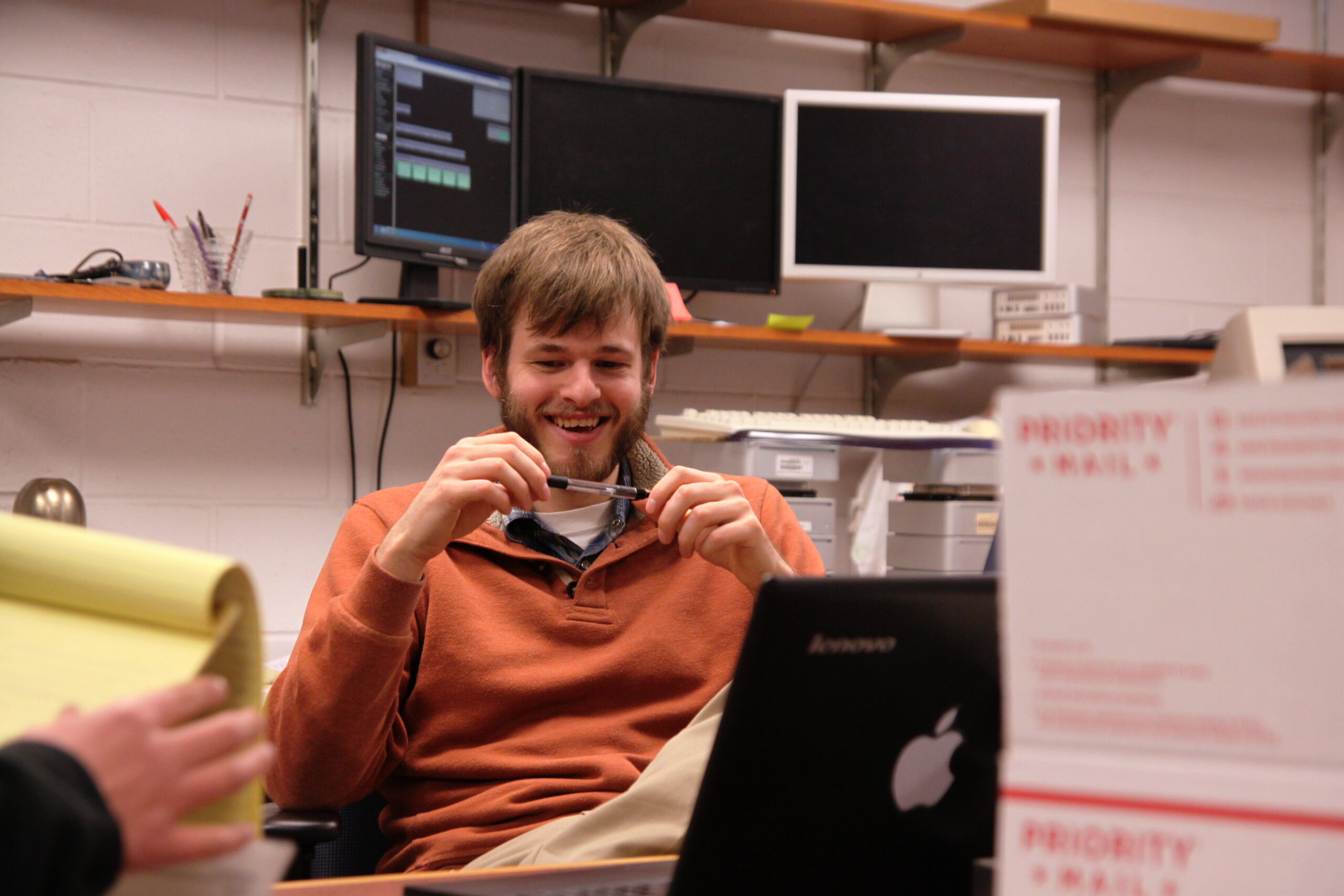When first-year students come to Goshen College, they receive complementary iPads loaded with apps to access class content, email, shared servers and a sneaky purple dinosaur.
Peter Miller, a GC graduate and information technology employee, added a purple dinosaur graphic to the bottom of the iPad email app as a prank before any first-years received their iPads. The dinosaur was only visible when the user scrolled down, and as soon as the finger released the scroll, the dinosaur disappeared. Strategies for sneakily showing the dinosaur had to be revised several times.The purple dinosaur lasted for several weeks before a rise in user complaints obligated Miller to make the purple dinosaur extinct.
“Pranks go over well within the ITS department,” said Miller. “Maybe it’s because we’re stuck underground together without any sunlight.”
Electronic pranking neither started nor stopped with the purple dinosaur. At 5:30 a.m. the morning of April 1, 2013, Micah Miller-Eshleman, then a third-year student, tiptoed up to his temporary office in Public Relations. As the web development intern, Miller-Eshleman had exclusive access to the website and all of its code. Miller-Eshleman simply replaced a line of code to draw content from his personal website. The content, however, was rather controversial.
By 6 a.m. at the dawn of April Fool’s Day, Goshen College’s homepage contained headlines announcing the formation of a Goshen College football team. Another headline announced that the students with majors in peace, justice and conflict studies were partnering with Taco Bell because they couldn’t find jobs anywhere else. Manipulated photos complemented the headlines, including a photo of one of the members of the President’s Council campaigning with Mitt Romney.
“I had dreamed of pranking the website for months,” Miller-Eshleman recalled. He even asked several fellow students to help write the stories. Ultimately, however, he knew he would “take the fall” for his actions.
The Public Relations department received calls within 20 minutes of the change and asked Miller-Eshleman to restore the website. The whole prank was committed and its evidence erased within an hour.
“The PR department and I had some talks, but I kept my job,” said Miller-Eshleman with a grin.
Miller-Eshleman can often be found laughing with his colleagues in the IT department. Although it’s buried in a basement and deprived of sunlight, the IT department is alive with the spirit of tomfoolery. The director of the department, Michael Sherer, conceded that he is no exception.
Sherer wrote most of the script for the political satire YouTube series “Haley Speaks,” in which a teenage girl relates herself deeply to the values of Sarah Palin.
He is also rather fond of pranks.
“I’m pretty clear that as long as nobody’s mean and nobody gets hurt, a little pranking every now and then is just fine,” said Sherer. He added that there have never been any problems in his department, because people have always known when to stop.
Although Sherer says he’s not much of a prankster himself, he sometimes ends up as the one being pranked.
Patricia Goodman, assistant director of IT, remembers a time when she and Sherer were working long hours with little sleep. Sherer fell asleep at his desk, and Goodman took a photo of the moment. For Boss’s Day that year, Sherer found what he regarded as an “unflattering” photo of himself sleeping taped to his door.
Electronic pranks have manifested outside of the IT basement as well. One early spring afternoon in 2012, Jeff Riehl, a former security guard, was locking the library when he heard a faint sound of echoing music. As he stepped outside, he realized that the music was closer than he thought. Even more, he was alarmed when he realized that the rock music was blasting from somewhere on campus.
Riehl recalled some students’ reactions. Students strolled through campus, enjoying the rare excitement, while Riehl scrambled to find the music’s source.
Just as a Kansas Bible Company song serenaded the campus, Riehl pinpointed the source: the “bell tower” speakers on top of the Union.
He and Glenn Gilbert, utilities manager, rushed to the mailroom in the Union, which was normally the home of a computer set to play chime sounds every fifteen minutes. Instead, they found another computer in its place, containing a playlist of upbeat rock.
Quickly, they switched the computers again, and the campus’s tranquility was restored.
“Glenn Gilbert confiscated the computer and tried to find out to whom it belonged, but nobody found out who the prankster was,” said Riehl.
Like others on campus, Riehl found the prank humorous when it was over.
“Pranks,” said Riehl, “promote an easygoing attitude about life.”



